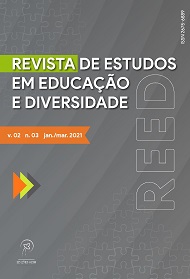PUBLIC POWER AND COMMUNITIES ACTIONS IN THE FIGHT FOR CLOSING SCHOOLS IN CARIRI PARAIBANO
DOI:
https://doi.org/10.22481/reed.v2i3.8165Keywords:
Field Education, Righttoeducation, Closingof rural schools, Paraiba’s CaririAbstract
The present work is the result of the research to conclude the degree course in Field Education, whose object of study was the public power actions and the community in the schools’ closure in the Sumé city, Paraiba State, Brazil. The dialectical approach contributed to understand the actions carried out in the process of closure and resistance, based on the procedures of document analysis and interviews with the subjects directly in the process. For an information analysis, connecting the content analysis (BARDIN, 2011), which contributed to identify the part of the public power to highlight the economic benefits to maintain schools with few students in the field, the pedagogical argument that the serial school at the city's headquarters, the quality of learning improves and the argument for the school’s closure as a solution to extinguish multiserial classes. In relation to communities, we identified actions to question closure as something natural, the view of the school in the community as a right and the understanding of the school as a collective space of cultural, social and affective experience for the community.
Downloads
References
ARROYO, M. G. Políticas de formação de educadores(as) de campo. Caderno Cedes, Campinas, v 27, n 72, p. 157-176, maio/ago. 2005. Disponível em: <http://www.cedes.unicamp.br>Acessado em: 02 mar. 2021.
BARDIN, L. Análise de conteúdo. São Paulo: Edições 70. 2011.
BARROS, R. A. de Q. A Gestão e a Organização das Escolasturmas multisseriadas nos Municípios de Barra de Santana e Boqueirão- Paraíba. Dissertação (Mestrado). Programa de Pós-Graduação em Educação, Universidade Federal de Campina Grande. Campina Grande- PB. 2020.
BATISTA, G. L. A política de Educação do Campo no território do Cariri Ocidental Paraibano: 2003 a 2013. Dissertação de Mestrado. UFCG. Campina Grande. 2020.
BRASIL. Lei de Diretrizes e Bases da Educação Nacional. Lei nº 9394, de 20 de dezembro de 1996. Estabelece as diretrizes e bases da educação nacional. Brasília, 1996.
BRASIL. [Constituição (1988)]. Constituição da República Federativa do Brasil de 1988. Brasília, DF: Presidência da República, [2019]. Disponível em: <http://www.planalto.gov.br/ccivil_03/Constituicao/Constituiçao.htm.>. Acesso em: 02 de mar. De 2021.
BRASIL. Decreto nº 7.352, de 4 de novembro de 2010. Dispõe sobre a política de educação do campo e o Programa Nacional de Educação na Reforma Agrária - PRONERA. Brasília: 2010. Disponível em: <http://www.planalto.gov.br/ccivil_03/_ato2007-2010/2010/decreto/d7352.htm> Acesso em: 02 de março de 2021.
CALDART, R. Educação do Campo: notas para uma análise de percurso. Trabalho, Educação e Saúde, Rio de Janeiro, v.7, n.1, p.35-64, mar./jun.2009.
FREIRE, Paulo. Pedagogia do oprimido. 17 ed. Rio de Janeiro: Paz & Terra, 2005.
_____. Pedagogia da Autonomia. São Paulo: Paz e Terra, 1996.
HAGE, S. A. M. Transgressão do paradigma da (multi) seriação como referencia para a construção da escola pública do campo. Educação & Sociedade, Campinas, v. 35, nº. 129, p. 1165-1182, out.-dez., 2014.
LÜDKE, M.; ANDRÉ. M. E. D. A. Pesquisa em Educação: Abordagens Qualitativas. São Paulo, EPU, 1986.
MINAYO, M. C. de S. (org.). Pesquisa Social. Teoria, Método e Criatividade. 21ª edição. Petrópolis: Vozes, 2002.
SALES, S. da S. Análise de um processo consolidado: histórico do percurso da nucleação de escolas rurais brasileiras (1989-1999). In: SIMPÓSIO NACIONAL DE HISTÓRIA, Anais... 27., Natal, RN, 22-26 jul. 2013.
SILVA, M. do S. Os saberes do professorado rural: construídos na vida, na lida e na formação. Dissertação (Mestrado). Programa de Pós-Graduação em Educação, Universidade Federal de Pernambuco – UFPE, 2000.
SILVA, M. do S. As práticas pedagógicas das escolas do campo: a escola na vida e a vida como escola. Tese (Doutorado). Programa de Pós-Graduação em Educação, Universidade Federal de Pernambuco – UFPE, Recife/Pernambuco, 2009.
Downloads
Published
How to Cite
Issue
Section
License
You are free to:
Share - copy and redistribute the material in any medium or format; Adapt - remix, transform, and build from the material for any purpose, even commercially. This license is acceptable for Free Cultural Works. The licensor cannot revoke these freedoms as long as you follow the terms of the license.
Under the following terms:
Attribution - You must appropriately give credit, provide a link to the license, and indicate if any changes have been made. You may do so in any reasonable way, but not in a way that suggests that you or your use is endorsed by the licensor.
There are no additional restrictions - You cannot apply legal terms or technological measures that legally restrict others to make any use permitted by the license.






